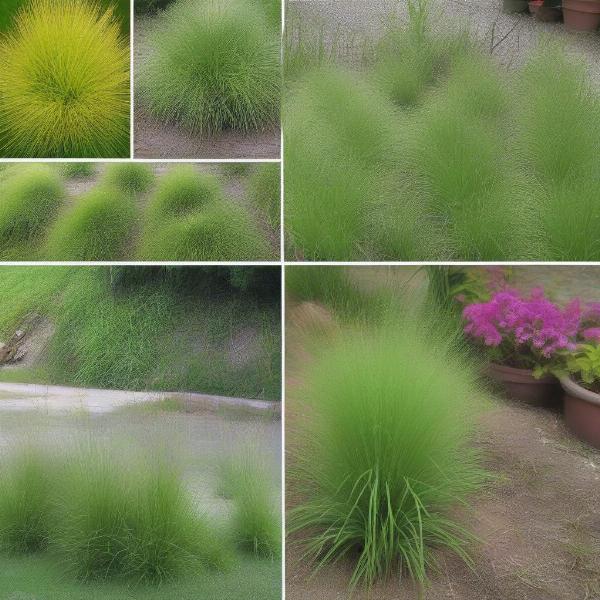Monkey grass, also known as mondo grass or lilyturf, is a popular ornamental plant in many gardens. Its attractive, grass-like foliage adds a touch of elegance to landscaping. But for dog owners, a crucial question arises: is monkey grass safe for our furry friends? The simple answer is: generally, yes. True monkey grass ( Ophiopogon japonicus) is non-toxic to dogs. However, there are important nuances to consider, and understanding the different types of “monkey grass” is vital to ensuring your dog’s safety.
Understanding the Different Types of “Monkey Grass”
The term “monkey grass” is often used colloquially to refer to several different plant species, some of which are toxic to dogs. It’s this confusion that makes it critical to identify exactly what type of plant you’re dealing with. True monkey grass, Ophiopogon japonicus, is generally considered non-toxic to dogs. However, plants like Liriope (also called lilyturf) and Dianella (blue flax lily) are often referred to as monkey grass but contain saponins, which can cause mild gastrointestinal upset if ingested in large quantities.
What Happens If My Dog Eats Monkey Grass?
If your dog nibbles on true monkey grass (Ophiopogon japonicus), you likely have nothing to worry about. It’s non-toxic and shouldn’t cause any harm. However, if your dog consumes a large amount of Liriope or Dianella (often mistaken for monkey grass), they might experience vomiting, diarrhea, or drooling. These symptoms are usually mild and resolve on their own.
What to Do If Your Dog Shows Symptoms
While true monkey grass is non-toxic, it’s always best to err on the side of caution. If your dog exhibits any unusual symptoms after ingesting any type of plant material, contact your veterinarian immediately. Provide them with as much information as possible, including the type of plant (if known), the quantity consumed, and the symptoms your dog is displaying.
Preventing Monkey Grass Ingestion
The best way to prevent potential problems is to discourage your dog from eating any plants in your garden. Here are a few tips:
- Training: Teach your dog a “leave it” command. This can be invaluable in preventing them from consuming potentially harmful plants.
- Supervision: Supervise your dog when they are in the garden, especially if they have a tendency to graze.
- Fencing: Consider fencing off areas of your garden where monkey grass or other potentially problematic plants are growing.
- Distraction: Provide your dog with plenty of chew toys and other engaging activities to keep them occupied and less likely to explore the garden for snacks.
Are There Any Toxic Look-Alikes?
While true monkey grass is non-toxic, some plants might be confused with it and could pose a danger. It’s important to correctly identify the plants in your garden to ensure your dog’s safety. If you’re uncertain about a plant’s identity, consult a local nursery or gardening expert.
 Toxic Plants That Resemble Monkey Grass
Toxic Plants That Resemble Monkey Grass
Conclusion
While true monkey grass (Ophiopogon japonicus) is non-toxic to dogs, it’s crucial to distinguish it from other similar-looking plants that can cause mild gastrointestinal upset. Careful observation, preventative measures, and prompt veterinary consultation if needed, are key to ensuring your furry friend’s well-being. By being informed and proactive, you can create a safe and enjoyable garden environment for both you and your dog.
FAQ
- Is all monkey grass safe for dogs? No, the term “monkey grass” can refer to different plant species, some of which are mildly toxic.
- What are the symptoms of monkey grass poisoning in dogs? If a dog ingests a large amount of Liriope or Dianella (often called monkey grass), they may experience vomiting, diarrhea, or drooling.
- What should I do if my dog eats monkey grass? If your dog eats true monkey grass (Ophiopogon japonicus), there’s likely no cause for concern. However, if they consume another type of “monkey grass” and show symptoms, contact your veterinarian.
- How can I prevent my dog from eating monkey grass? Train your dog with a “leave it” command, supervise them in the garden, fence off areas with potentially harmful plants, and provide alternative chew toys.
- Are there any other plants I should be aware of? Yes, many plants can be toxic to dogs. Research and identify all the plants in your garden to ensure they are safe for your pet.
- What is the scientific name for true monkey grass? Ophiopogon japonicus.
- Where can I find more information on pet-safe gardening? Consult your veterinarian or a reputable online resource dedicated to pet safety.
ILM Dog is your trusted source for all things dog-related. We offer expert advice on breed selection, health & medical care, training & behavior, nutrition & feeding, grooming, products, and accessories. Whether you’re a new dog owner or a seasoned pro, our comprehensive resources can help you navigate every aspect of dog ownership. For personalized guidance and recommendations tailored to your dog’s specific needs, contact us today. Email: [email protected], Phone: +44 20-3965-8624. Visit ILM Dog for more information.